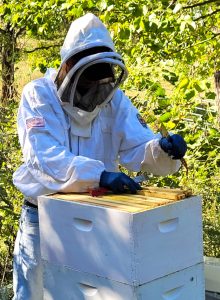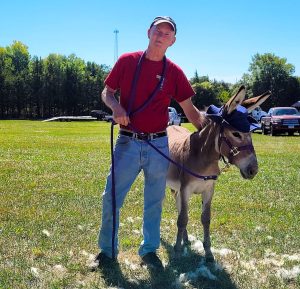
Beginning farmer and 25-year Army veteran Eric Work’s calendar is full of educational programs offered by University of Missouri Extension.
“MU Extension programs are a godsend,” Work says. “I benefit from the amazing, high-quality learning opportunities that University of Missouri Extension continually provides, not only to veterans but many other diverse groups that are interested in learning and potentially pursuing new careers.”
A favorite of Work’s is the Heroes to Hives program, which trains veterans in beekeeping. MU Extension agronomist Travis Harper teaches the hands-on portion of the program in Missouri. Army veteran Adam Ingrao of Michigan State University Extension, who developed the program, presents the online portion.
Students receive two to six hours of prerecorded lecture content from March to November so that they can learn at their own pace. On-ground training is April to October at the Heroes to Hives apiaries at the University of Central Missouri’s Mitchell Street Farm in Warrensburg and the MU Southwest Center at Mount Vernon. Participants learn ways to earn income through the sale of honey as well as value-added products such as candles, lip balms and mead.

More important than the technical knowledge is the opportunity to connect with other veterans, says Work. Missouri has more than 440,000 veterans making the transition from military to civilian life. “A lot of veterans come right out of the service and may feel disconnected and may be struggling with finding job opportunities or facing other issues,” he says. “The Heroes to Hives program offers a diversion as well as opportunities.”
Work grew up in a military family. His father retired from the military, his brother, Richard, served for 20 years, and one of his sons is in the U.S. Air Force in Okinawa.
Work says Heroes to Hives served as a gateway to other MU Extension programs, such as Missouri Beginning Farmers and Ranchers, which helps him learn about business plans, government programs and grants for farmers and ranchers, financing and how to grow and market specialty crops. He works full-time as a business continuity/disaster preparedness professional but is preparing for another career as a farmer.
Bees are not Work’s only passion. He is on the advisory board for Peaceful Pastures Donkey Rescue in Lincoln, Missouri. The nonprofit rescues donkeys that are abused, neglected or at risk for slaughter. Work’s 35-acre farm in Potosi includes eight horses, 13 dogs, 14 cats and a house pig named Mojo. Most are rescue animals.
To learn more about Heroes to Hives, call 800-995-8503 or visit mizzou.us/heroestohives.